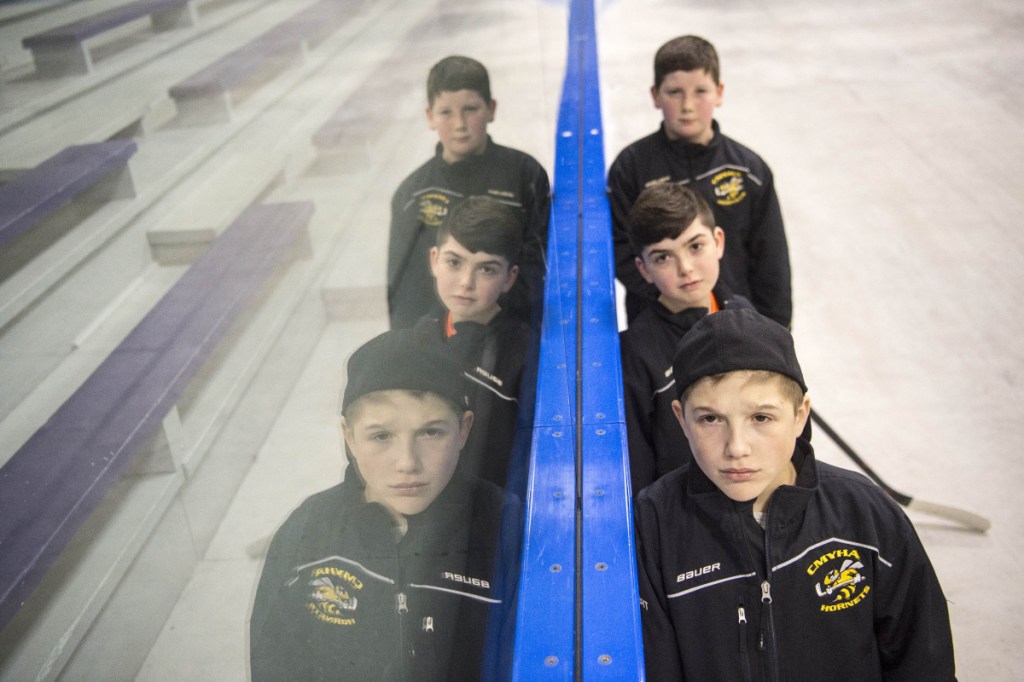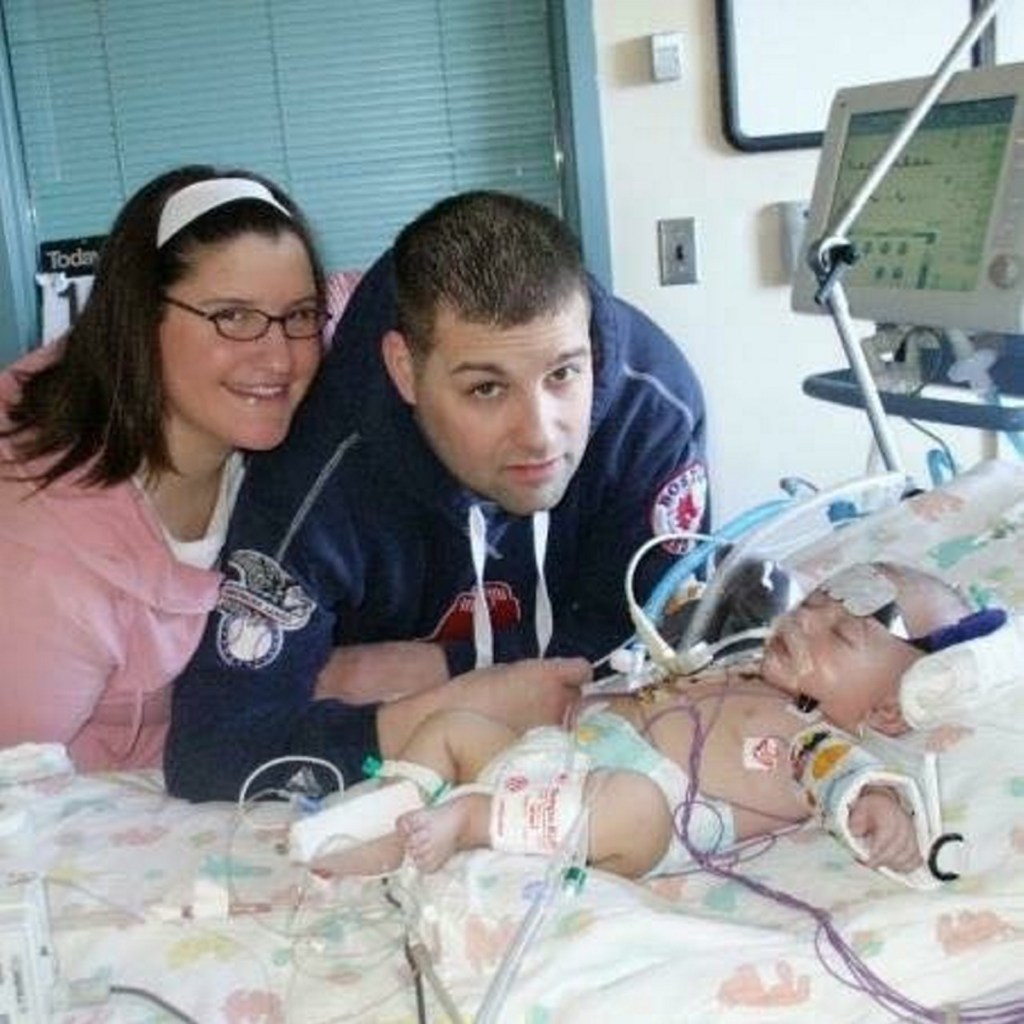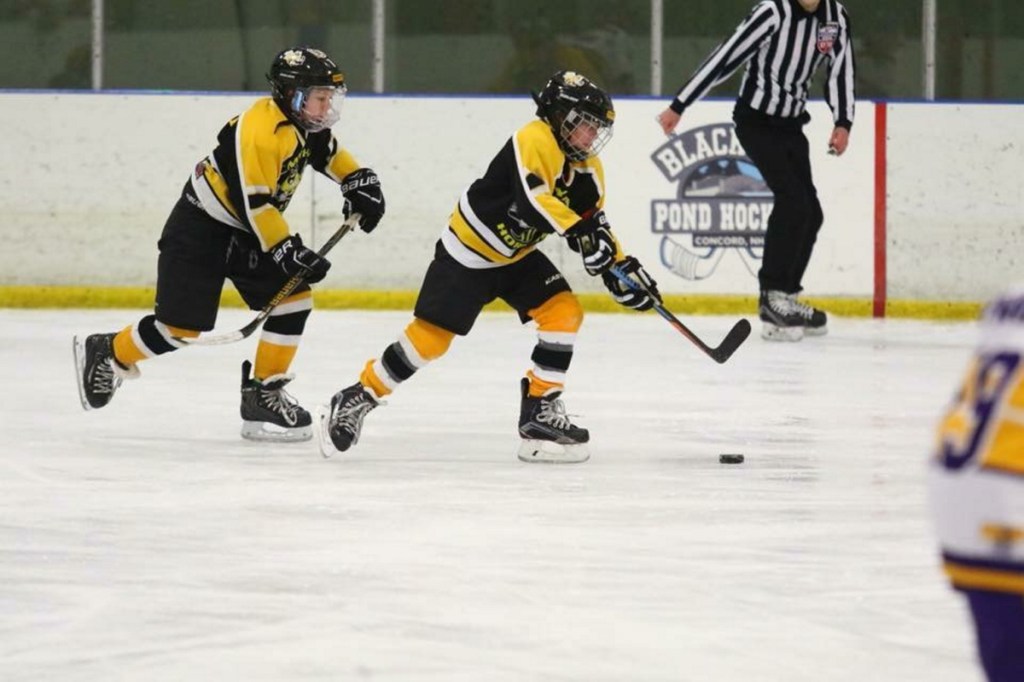WATERVILLE — Cooper Tardiff returns from a foray into the stands at Alfond Rink with a wide grin. He’s found an errant puck buried under a bleacher row, and he raises it triumphantly into the air before tossing it out onto the cozy arena’s concrete surface previously occupied by a sheet of ice over the winter.
Sticks seem to appear out of thin air, almost magically, as boys run out onto the rink and begin a modified game of street hockey which appears to have no rules. At the very least, only they know the rules. They run and run and run, young hockey players killing time in an empty rink while a winter that won’t let go continues to dump snow outside the building.
It’s the very sports scene that is the essence of Maine winters — young boys, a hockey rink, bleary-eyed mothers looking on, styrofoam coffee cups, proud dads with smiles and small talk. What you wouldn’t know, not by watching the modified shinny on a Friday afternoon, is that this game of hockey almost never happened. Three boys, all between the ages of 10 and 11, beat the odds to get here, playing hockey this season in the Central Maine Youth Hockey Association.
Cooper Tardiff, a 10-year-old lefthanded shot with a perfectly coiffed shock of black hair, is the one in 1-in-14,000 born with the cleft palate and throat condition known as Pierre Robin Sequence. The extremely rare disease has led Tardiff to 14 surgeries, all of them before he turned 7-years-old.
Bret Lambert, a little spitfire who embodies “hockey tough” in his eyes and his gait, has endured a series of congenital heart defects since he was born. Four times already in his 10-year-old life, he’s undergone open heart surgery, most recently when he was 5 to put in the pacemaker that keeps his heart pumping enough to keep up with his active little lifestyle.
And then, remarkably, there’s 11-year-old Adam Farrell, a rugged righty with a vicious poke check. Imagine everybody’s surprise — nobody more so than the Tardiff family — when it was learned that Adam has the same PRS condition as Cooper.
Three players. On the same CMYHA squirt team. On a roster of 12.
One-quarter of a youth hockey team having defied all the odds to even play hockey at all.
‘THINGS NO PARENT SHOULD HAVE TO DEAL WITH, WE’VE HAD TO DEAL WITH’
Hearing the parents of the three boys tell their stories, hour after hour, one horrific detail after the next, is heart-wrenching. When you think a parent can’t possibly endure more, there is more, there is always more. There is always another hurdle, another obstacle, another round of questions about when it will all sink into some type of normal.
It doesn’t.
“At first they told us it was just a cleft palate, and it was ‘not a big deal,’ ” said Barb Farrell of Vassalboro, Adam’s mother. “He had a tracheostomy 11 days later.”
There are tracheostomy tubes that block or break. There is a heart that stops for eight minutes. There are midnight trips to emergency rooms, to specialists, to Boston. There is being trapped in an airport in the middle of the country with no way to procure immediate replacement for a life-saving part which has malfunctioned. In total, Cooper Tardiff, Bret Lambert and Adam Farrell have had 29 surgeries between them, from open-heart to entire palate reconstruction.
They are painful, they are angst-ridden, they are emotional. And all of them have been performed on tiny children.
“There are things no parent should have to deal with, we’ve had to deal with,” said Waterville’s Derek Tardiff, Cooper’s father, stating a painfully obvious truth.
The Pierre Robin Sequence, which effects both Cooper Tardiff and Adam Farrell, is extremely rare. The major symptoms of which include a cleft palate, a recessed jaw, an extremely narrow airway and ear and sinus complications. According to the U.S. National Library of Medicine, PRS can occur in less than 0.007 percent of births — making it more than 10 times less likely than the occurrence of a cleft palate alone.
Cooper went five weeks before being diagnosed. There were horrifying instances of lips turning blue, an inability to nurse and, worst of all, silence — the silence of a baby unable to breathe. He had a tracheotomy tube placed in his throat so he could breathe, a gastrointestinal tube (which is still in place today, for supplemental nutrition as needed) in his stomach, ear tube implants, stomach wraps to help him keep food down, and a nissen fundoplication (which is as awful as its name implies) — twice — to ward off serious acid reflux.
And those are only a sample of the surgeries and procedures Tardiff has had to date.
Perhaps more unbelievable than Cooper’s lifelong ordeal is the fact that the Farrell family can relate. One-in-14,000 nationwide is somehow 2-in-14,000 in central Maine.
“He literally lived in the ICU for 30 days after he was born,” Mike Farrell, Adam’s father, said. “I don’t think Barb slept for two years. She was morning, noon and night with him.”
To say Bret Lambert, who lives in Winslow, has “a heart condition” is akin to suggesting Moosehead Lake is “big.” He has four different defects in his heart, notably that his right ventricle has not grown and an arterial transposition in which his major arteries carry oxygenated blood toward his heart instead of away from it. Those two abnormalities almost make the fact he has a slow, irregular heartbeat an afterthought.
Bret was stillborn for eight and a half interminable minutes. He had his first heart surgery at just 15 days old.
The three boys have emerged from the most serious of their illnesses as they approach middle-school age, but they all wear the scars of too much time spent in hospitals — literally and figuratively. Bret has a pacemaker, Tardiff has a gastro tube and the roof of Adam’s mouth still isn’t closed completely.
Cover each of them in a helmet and hockey pads, though, and you wouldn’t notice a thing.
THE FORCE IS STRONG WITH THIS ONE
The hockey bond in this group is — to paraphrase the Jedi master Yoda from the Star Wars movies — “strong with this one.”
“It’s a cliche, corny thing,” said Leslie Tardiff, Cooper’s mother, of what it’s like today to watch her son play the game he loves. “But when you have a boy, you start dreaming about how he’s going to be an athlete. We didn’t think that was going to be possible, and we’d come to terms with it. Now that I see him out there on the ice, it makes it that much more special.”
Bret’s mother, Becky, feels the same way, but she also has her doubts. Unlike Cooper and Adam, Bret is restricted to non-contact participation in sports. There is no checking at this level (it’s not that many years away, however) and hockey is always unpredictable. Contact may not be intentional, but it still can happen when players collide accidentally. Even a hard slap shot that rises above ice level poses a risk to Bret should it fire into his chest.
“Sometimes it makes me nervous that I’m rolling the dice when I shouldn’t be,” Becky Lambert said. “You hear of healthy kids getting knocked out (playing hockey), but I’ve got to let him do it. He’s been through so much already and he loves it.”
Andy Lambert is in a very unique position. Not only is he Bret’s father, but he’s also the team’s coach.
Does he do it because he loves the game, because he loves the teaching aspect? Or does he do it because, subliminally, it would be difficult to trust the literal life-or-death consequences his son faces to the hands of another coach?
“It’s probably an easy feeling for me to be on the bench,” said Andy Lambert, who played on Waterville Senior High School’s 1991 state championship team. “But I do love hockey.” The Tardiffs feel as though they are fortunate to have a coach who understands that the boys need both a safeguard and a teacher at the same time.
“It was a huge relief,” Leslie Tardiff said.
Make no mistake, though. These three boys aren’t just taking up space on the roster, “playing” hockey by just showing up as below-average players. Farrell led the team in goals this winter, Tardiff was named the Most Inspirational Player and Lambert was one half of “The Bash Brothers,” with the T-shirt to prove it.
“Sports are so good for them,” Leslie Tardiff said. “They don’t care about what these kids have been through. They’re all there for the same reason: To play hockey together.”
Travis Barrett — 621-5621
tbarrett@centralmaine.com
Twitter: @TBarrettGWC
Send questions/comments to the editors.






Comments are no longer available on this story